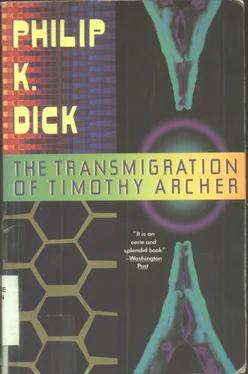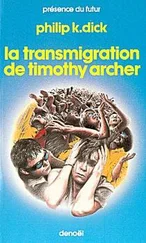Philip Dick - The Transmigration of Timothy Archer
Здесь есть возможность читать онлайн «Philip Dick - The Transmigration of Timothy Archer» весь текст электронной книги совершенно бесплатно (целиком полную версию без сокращений). В некоторых случаях можно слушать аудио, скачать через торрент в формате fb2 и присутствует краткое содержание. Жанр: Фантастика и фэнтези, на английском языке. Описание произведения, (предисловие) а так же отзывы посетителей доступны на портале библиотеки ЛибКат.
- Название:The Transmigration of Timothy Archer
- Автор:
- Жанр:
- Год:неизвестен
- ISBN:нет данных
- Рейтинг книги:4 / 5. Голосов: 1
-
Избранное:Добавить в избранное
- Отзывы:
-
Ваша оценка:
- 80
- 1
- 2
- 3
- 4
- 5
The Transmigration of Timothy Archer: краткое содержание, описание и аннотация
Предлагаем к чтению аннотацию, описание, краткое содержание или предисловие (зависит от того, что написал сам автор книги «The Transmigration of Timothy Archer»). Если вы не нашли необходимую информацию о книге — напишите в комментариях, мы постараемся отыскать её.
The Transmigration of Timothy Archer — читать онлайн бесплатно полную книгу (весь текст) целиком
Ниже представлен текст книги, разбитый по страницам. Система сохранения места последней прочитанной страницы, позволяет с удобством читать онлайн бесплатно книгу «The Transmigration of Timothy Archer», без необходимости каждый раз заново искать на чём Вы остановились. Поставьте закладку, и сможете в любой момент перейти на страницу, на которой закончили чтение.
Интервал:
Закладка:
"Yep," I said.
"But he can earn a living."
"When he's not in the hospital," I said. "Or spiraling into himself and on the way to the hospital."
"He seems to be doing fine right now. But I note-an inability to theorize."
"He has trouble abstracting," I said.
"I wonder where and how he'll wind up," Tim said. "The prognosis ... it's not good, Kirsten says."
"It's zero. For recovery. Zilch. Zip. But he's smart enough to stay off drugs."
"He does not have the advantage of an education."
"I'm not sure an education is an advantage. All I do is work in a record store. And I wasn't hired for that because of anything I learned in the English Department at Cal."
"I've been meaning to ask you which recording of Beethoven's Fidelio we should buy," Tim said.
"The Klemperer," I said. "On Angel. With Christa Ludwig as Leonora."
"I am very fond of her aria," Tim said.
"'Abscheulicher! Wo Eilst Due Hin?' She does it very well. But no one can match Frieda Leider's recording years ago. It's a collectors' item ... it may have been dubbed onto an LP; if so, I've never seen it. I heard it once over KPFA, years ago. I never forgot it."
Tim said, "Beethoven was the greatest genius, the greatest creative artist the world has ever seen. He transformed man's conception of himself."
"Yes," I said. "The prisoners in Fidelio when they're let out into the light ... it is one of the most beautiful passages in all music."
"It goes beyond beauty," Tim said. "It involves an apprehension of the nature of freedom itself. How can it be that purely abstract music, such as his late quartets, can without words change human beings in terms of their own awareness of themselves, in terms of their ontological nature? Schopenhauer believed that art, in particular music, had-has-the power to cause the will, the irrational, striving will, to somehow turn back onto and into itself and cease to strive. He considered this a religious experience, although temporary. Somehow art, somehow music especially, has the power to transform man from an irrational thing into some rational entity that is not driven by biological impulses, impulses that cannot by definition ever be satisfied. I remember when I first heard the final movement of the Beethoven Thirteenth Quartet-not the 'Grosse Fuge' but the allegro that he added later in place of the 'Grosse Fuge.' It's such an odd little bit, that allegro ... so brisk and light, so sunny."
I said, "I've read that it was the last thing he wrote. That little allegro would have been the first work of Beethoven's fourth period, had he lived. It's not really a third-period piece."
"Where did Beethoven derive the concept, the entirely new and original concept of human freedom that his music expresses?" Tim asked. "Was he well-read?"
"He belonged to the period of Goethe and Schiller. The Aufklarung, the German Enlightenment."
"Always Schiller. It always comes back to that. And from Schiller to the rebellion of the Dutch against the Spanish, the War of the Lowlands. Which shows up in Goethe's Faust, Part Two, where Faust finally finds something that will satisfy him, and he bids the moment stay. Seeing the Dutch reclaiming land from the North Sea. I translated that passage, once, myself; I wasn't satisfied with any of the English translations available. I don't know what I did with it ... that was years ago. Do you know the Bayard Taylor translation?" He rose, approached a row of books, found the volume, brought it back, opening it as he walked.
"'Below the hills, a marshy plain infects what I so long have been retrieving: that stagnant pool likewise to drain were now my latest and my best achieving. To many millions let me furnish-soil, though not secure, let free for active toil: green, fertile fields, where men and herds go forth at once, with comfort, on the newest earth, all swiftly settled on the hill's firm base, raised by a bold, hard-working populace.
In here, a land like Paradise about:
up to the brink the tide may roar without,
yet though it gnaw, to burst with force the limit,
by common impulse all men seek to hem it.
Yes! to this thought I hold with firm persistence,
this wisdom's ultimate and true:
he only earns his freedom and existence-' "
I said, "'Who daily conquers them anew."'
"Yes," Tim said; he closed the copy of Faust, Part Two. "I wish I hadn't lost the translation I made." He then opened the book again. "Do you mind if I read the rest?"
"Please do," I said.
"'Thus here, by dangers girt, shall glide away of childhood, manhood, age, and vigorous day. And such a throng I fain would see, stand on free soil among a people free!
Then dared I hail the Moment fleeting,
"Ah, finger still-thou art so fair!" '"
"At that point God has won the bet in heaven," I said.
"Yes," Tim said, nodding.
" 'The traces cannot, of mine earthly being, in aeons perish: they are there!
Anticipating here such lofty bliss,
I now enjoy the highest Moment,-this.' "
"That's a very beautiful and clear translation," I said.
Tim said, "Goethe wrote Part Two just a year before his death. I remember only one German word from that passage: verdienen. Earns. 'Earns his freedom.' I suppose that would be Freiheit, freedom. Perhaps it went, 'Verdient seine Freiheit-' " He broke off. "That's the best I can do. 'Earns his freedom who daily conquers it-them, freedom and existence-anew.' The highest point in German Enlightenment. From which they so tragically fell. From Goethe, Schiller, Beethoven to the Third Reich and Hitler. It seems impossible."
"And yet it had been prefigured in Wallenstein," I said.
"Who picked his generals by means of astrological prognostications. How could an intelligent, educated man, a great man, really, one of the most powerful men of his times-how could he begin to believe in that?" Bishop Archer said. "It is a mystery to me. It is an enigma that perhaps will never be solved."
I saw how tired he was, so I got my coat and purse, said good night, and departed.
My car had been ticketed. Shit, I said to myself as I pulled the ticket from the wiper-blade and stuck it into my pocket. While we're reading Goethe, Lovely Rita Meter-Maid is ticketing my car. What a strange world, I thought; or, rather, strange worlds-plural. They do not come together.
9
BISHOP TIMOTHY ARCHER conceived in his mind after much prayer and pondering, after much application of his brilliant analytical faculties, the notion that he had no choice but to step down as Bishop of the Episcopal Diocese of California and go-as he phrased it-into the private sector. He discussed this matter with Kirsten and me at length.
"I have no faith in the reality of Christ," he informed us. "None whatsoever. I cannot in good conscience go on preaching the kerygma of the New Testament. Every time I get up in front of my congregation, I feel that I am deceiving them."
"You told Bill Lundborg that night that Christ's reality is proven by Jeff coming back," I said.
"It's not," Tim said. "It fails to. I have exhaustively scrutinized the situation and it fails to."
"What does it prove, then?" Kirsten said.
"Life after death," Tim said. "But not the reality of Christ. Jesus was a teacher whose teachings were not even original. I have the name of a medium, a Dr. Garret living in Santa Barbara. I will be flying down there to consult him, to try to talk to Jeff. Mr. Mason recommends him." He examined a slip of paper. "Oh," he said. "Dr. Garret is a woman. Rachel Garret. Hmmm ... I was certain it was a man." He asked if the two of us wished to accompany him to Santa Barbara. It was his intention (he explained) to ask Jeff about Christ. Jeff could tell him, through the medium, Dr. Rachel Garret, if Christ were real or not, genuinely the Son of God and all the rest of that stuff that the churches teach. This would be an important trip; Tim's decision as to whether to resign his post as bishop hinged on this.
Читать дальшеИнтервал:
Закладка:
Похожие книги на «The Transmigration of Timothy Archer»
Представляем Вашему вниманию похожие книги на «The Transmigration of Timothy Archer» списком для выбора. Мы отобрали схожую по названию и смыслу литературу в надежде предоставить читателям больше вариантов отыскать новые, интересные, ещё непрочитанные произведения.
Обсуждение, отзывы о книге «The Transmigration of Timothy Archer» и просто собственные мнения читателей. Оставьте ваши комментарии, напишите, что Вы думаете о произведении, его смысле или главных героях. Укажите что конкретно понравилось, а что нет, и почему Вы так считаете.










